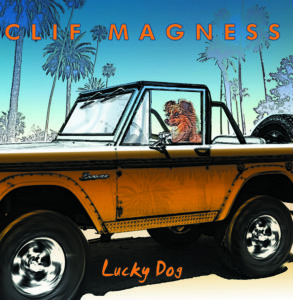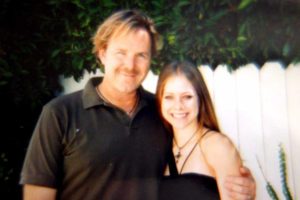
Grammy-award winning songwriter and producer Clif Magness has dedicated his professional career to helping craft songs that lodge their way into the hearts and minds millions of music lovers, often catapulting the artists that perform them to international stardom.
The roster of acts who have recorded the soft-spoken Texan’s tunes reads like a who’s who of the music industry over the past three decades. After years of writing for others, he decided to turn his talents in the studio to his own purposes, writing, recording and releasing his new solo album, Lucky Dog, on July 13, through Frontiers Music.
Magness doesn’t need to release a new solo album to add to his impressive legacy as a hitmaker who can write, arrange and produce songs that top charts and embed themselves into the pop culture. He has a record of accomplishments that is as diverse and varied as it is long. A well-respected professional within the music industry, Lucky Dog came together primarily as a way of thanking fans who have been asking for new music from him for years.
“Through things like Facebook and other social media outlets, I have had loads of loyal fans asking me to do a new record. And a lot of other things had converged by this point as well. Pop music has sort of morphed into a different style that’s not really my style, so I just thought ‘let’s do another record, have some fun and call some of my old songwriting buddies and write some new stuff,” Magness said from his home in Santa Barbara, California.
“I also had a lot of new studio gear, including a drum program called Superior Drummer which sounds like a real drummer. And I am a drummer, so I know how to program it to make it sound really great, and realistic. I think that all of those factors came together, but it was mainly the fans writing in and asking for another record. And I have done okay in the business, so I have the freedom to do what I wanted to do. But I definitely wanted to satisfy the fans from the outset. I really want to thank the fans for sticking with me.
“And it was my wife who actually thought of the name Lucky Dog. It was so simple, and she said, ‘you know, you are a lucky dog.’ And I don’t want to flaunt that fact, but I have been really blessed and have had all my dreams pretty much come true that I had as a young child.”
Magness grew up in Lubbock, Texas, which also happens to be the home of a number of other music luminaries over the years, including the early rock and roll legend Buddy Holly.
“As a matter of fact, most of my buddies I grew up with and played in bands with are still living there. It’s actually still a really thriving scene. Texas Tech University is there so there are 40,000 students wanting to go to a bar and have music to listen to. There are so many great songwriters and artists there and many of them are on a special Buddy Holly [West Texas] Wall of Fame: Mac Davis, Waylon Jennings, Delbert McClinton and Richie McDonald who was in the band Lonestar too,” he said.
 “I was inducted the same year as Richie, 2004. People wonder what’s in the water and I just tell them that Lubbock is in the middle of the great plain, it’s as flat as it can be and there’s really nothing else to do but play music if you’re so inclined. It’s a great place to grow up and do that. I left Lubbock when I was 19 and moved to Los Angeles with high hopes. My roommate and I moved there with intentions of being the next Loggins and Messina [You’re Mama Don’t Dance]. We were pretty naïve obviously.
“I was inducted the same year as Richie, 2004. People wonder what’s in the water and I just tell them that Lubbock is in the middle of the great plain, it’s as flat as it can be and there’s really nothing else to do but play music if you’re so inclined. It’s a great place to grow up and do that. I left Lubbock when I was 19 and moved to Los Angeles with high hopes. My roommate and I moved there with intentions of being the next Loggins and Messina [You’re Mama Don’t Dance]. We were pretty naïve obviously.
“We just knocked on doors all up and down Sunset Boulevard until I finally got a job at Chrysalis Records in the mail room. And the first day I worked there I mailed out Blondie’s Parallel Lines, Pat Benatar’s first album – it was a heady time for this young Texan.”
He soon became an in-demand songwriter, writing for a number of genres and artists over the years and by the late 1980s and early 1990s was working alongside music luminaries such as Quincy Jones and Canadian David Foster. In 1990 he won a Grammy Award alongside Jones and Glen Ballard for Best Instrumental Arrangement Accompanying Vocals and was nominated for another in 1994 in the category of Best Song Written Specifically for a Motion Picture or Television for co-writing The Day I Fall in Love, which was performed by Dolly Parton and James Ingram. The same song, from the family film Beethoven’s 2nd was also nominated for an Oscar and Golden Globe
His stock as a songwriter, arranger and producer continued to rise and over the next couple of decades, Magness co-wrote or produced songs for the likes of Celine Dion, Amy Grant, Jack Wagner, Wilson Phillips, Lisa Marie Presley, Clay Aiken, Barbra Streisand, Julio Iglesias and most famously, country crossover star Kelly Clarkson, and Napanee, Ontario’s Avril Lavigne. Magness helped write and produce several songs on Lavigne’s 2002 debut album Let Go, including Losing Grip, and his follow-up work with Clarkson helped peg him as an exceptional writer/producer for female artists.
“Avril was only 16 and had just started out when I worked with her, but what I got from her was that she was such a good person who just wanted to work hard. She didn’t necessarily want to be famous, she just wanted to be good at what she did, and she wanted to be taken seriously. That was the main thing,” Magness said.
“When we wrote together, I was very lenient and freeing. I wanted her to take the reins on the lyrical content because what do I know about being a 16-year-old girl? I just helped her out grammatically and obviously being a songwriter for years I can help her with structure and things like that, but I wanted her to talk about what she wanted to talk about. I am not saying she didn’t want to be famous, I’m just saying that wasn’t her priority. I had a lot of respect for her for that. She was always so soft spoken too, you wouldn’t think there was a major rock star lurking underneath all that.”
Working alongside Quincy Jones as a relatively unknown songwriter and studio musician in a town (L.A.) full of aspiring writers and musicians was a daunting proposition, and one that still sticks in Magness’ memory.
“When the rubber meets the road and you’re in the room with guys like that you’ve gotta to keep your cool and you’ve gotta do your job. Obviously, the jitters set in prior to the actual session and then after you sort of get excited, but during the time in the studio you have to play it cool. The first session I did with Quincy was for a song called It’s Gonna Be Special that Glen Ballard and I wrote that Patti Austin sang for the movie Two of a Kind with John Travolta and Olivia Newton John. Quincy produced it and we had a lot of great players on that record,” he said.
“I had a guitar solo in the middle of it, and I am sitting right next to Quincy at the board and I was literally melting, thinking this is as good as it gets and it’s terrifying at the same time. So, I played the solo and he said it was good, but how about one more. I play it again and he said ‘yeah, I think that’s good, but I think you can do it better.’ At some point in the back of my mind I remembered a conversation I had with someone who said that anytime you play for Quincy in the studio, you’ve got to really look like you’re having a great time and getting into your playing physically and vividly.
“Because I was scared, I wasn’t doing anything; I was like a statue. So, I played it the same way I had been playing it for the third time, but I moved my head and my body a little bit and was expressive and he was like ‘yes, that’s it!’ I enjoyed working with David Foster too. Both he and Quincy were extremely pleasant and encouraging and gave off nothing but great vibes. That was what I learned about producing other artists – put them at ease, coach them and encourage them and make them feel comfortable.”

Lucky Dog not only sees Magness at ease as the producer and arranger, but also as a singer, multi-instrumentalist and songwriter. And he is also comfortable in his melodic rock skin, even though it is miles away from the pop stylings of Avril, Clarkson et al.
“I love rock and roll. I cut my teeth on The Beatles, Spirit, the Doobie Brothers, ZZ Top and all that sort of stuff. I love a good pop song for sure, and working with David Foster and Quincy Jones, but I gravitate towards really good, solid rock. And being a songwriter and a singer, I like a good melody too. So, anything like 1980s Bon Jovi is really in my wheelhouse,” Magness said, with the realistic understanding that that sort of melodic rock is not as popular or fashionable in the U.S. as it still is in many other countries around the globe.
“That’s the great thing about my label Frontiers is they know there is an audience out there worldwide that really craves the stuff. I have received some really emotional responses from people in France and Germany and even Japan and Sweden. It’s really gratifying. It’s nice to know a good song with good lyrics that is well sung and has some good harmonies and riffs is still appreciated.”
Thematically Lucky Dog projects an image of positivity and personal strength, particularly on songs like the first single/video Ain’t No Way.
“There is an overall theme of self worth and pulling yourself up by your bootstraps and keep on moving forward. Because if you’re a human being on this planet, you will go through dark times, and you will come out on the other side. You will move forward most of the time if you have the right mindset about it. Ain’t No Way is geared for that where I am talking about someone not getting me down. And the song Unbroken is saying that it didn’t break, it’s just bruised and, again that’s about getting knocked down but getting back up again,” Magness said.
“Like I said, every human goes through it, so it’s nice to have some sort of positive musical inspiration for people to draw a positive feeling from. The Beatles did that for me as a kid growing up and they still do that for me now. If I am having a blue moment I put on a Beatles songs and instantly feel better.”
One of Magness’s collaborators on Lucky Dog was longtime songwriting pal Brock Walsh, who helped compose one of the album’s most evocative songs, the Celtic tinged Nobody but You.
“Sometimes I will just sit down and tune my acoustic guitar a wacky way and end up writing a light motif as Quincy would call it, or a lick as any other guitar player would say. And on that song, that’s what came first – the guitar riff. And then I had the melody that seemed to sort of answer the lick, so there was this cool call and response thing happening,” he said.
“I told Brock I wanted something that was like what Collective Soul would do, or the Rolling Stone’s Wild Horses. I just thought the album needed an acoustic song that was thoughtful for a moment. And I just loved the lyric that Brock came up with. And I thought the Irish pipe was a great addition to the mood of the piece. It’s acoustic, it’s historical, it’s the original instrument of the entire human race which came from Peru and the Irish pipe is a descendant of that. I just felt this song needed that touch, because I am Irish, you know.”
Magness said he would like to take his songs on the road – not just the songs from Lucky Dog, but many of the hits that he has produced or written over the past 30 years, as kind of showcase of his impressive repertoire.
“I am sort of new to this end of the music business and am kind of waiting to see the response to the record. If I get some good hot spots in terms of sales and airplay in Europe perhaps I can get in contact with a booking agent and work something out. Even though I don’t have many hits as an artist, I have had some recognition from other songs and I will do those,” he said.
For more information, visit http://cliftonmagness.com.
- Jim Barber is a veteran award-winning journalist and author based in Napanee, ON, who has been writing about music and musicians for a quarter of a century. Besides his journalistic endeavours, he now works as a communications and marketing specialist. Contact him at jimbarberwritingservices@gmail.com.
SHARE THIS POST:
